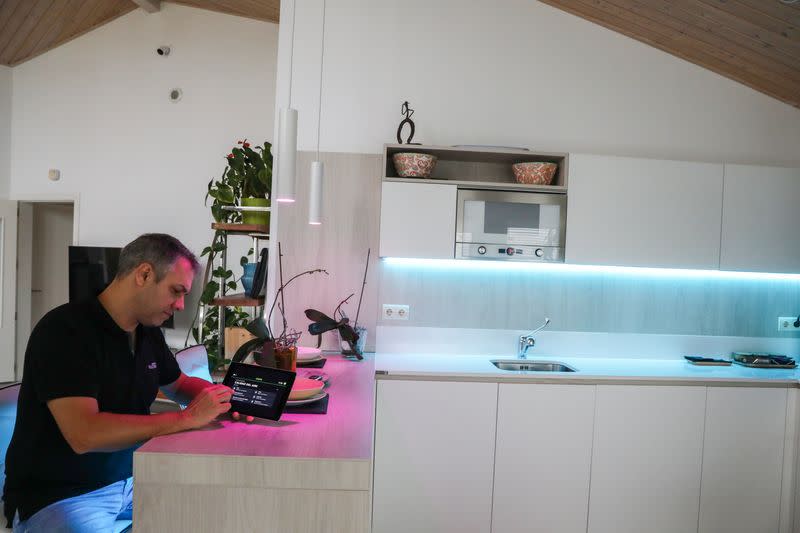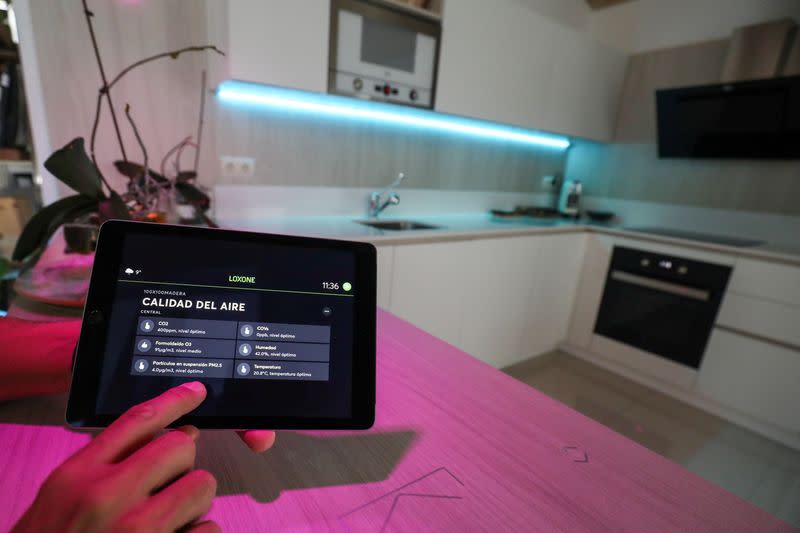Spanish home-buyers want big, bright and airtight in response to coronavirus
By Clara-Laeila Laudette, Silvio Castellanos and Juan Antonio Dominguez
MADRID (Reuters) - After Spain's stringent coronavirus lockdown trapped many in cramped urban flats, builders and architects say demand for new homes with more space, better air quality and higher security has soared.
From state-of-the-art ventilation systems to comfy at-home work spaces and more outdoor areas, the COVID-19 crisis has changed the market, real estate agents say.
"Space usage is a new theme: dividing what comes from outside and could be contaminated," said Madrid-based architect Jaime Pablo.
There are no official COVID-safe labels for buildings yet, but people crave bigger, brighter, more multi-purpose spaces, Pablo said.
Designing interiors in the pandemic era is about creating areas to hang and sanitise masks, or removing walls and putting in dividers, he said, for instance to integrate a home office into a kitchen.
"People now ... want luminous, open remote workspaces, even if it costs them square metres," said Ander Echevarria, the founder of 100x100 Madera, a building company specialising in all-wood, low-emission homes.
Echevarria said enquiries had near-quadrupled over the past four months. Sales have more than doubled from last year's levels and he projects them to near-triple by the end of the year.
"About 90% of client requests since spring included queries about ventilation systems," he said, tapping a screen in his showhouse kitchen which displays the air's CO2 and formaldehyde levels.
While he says his houses fully renew their air in an hour and 10 minutes, Echevarria has had to explain to coronavirus-fearing customers that fitting aeronautical grade filters would be of little use.
"What's more useful is extracting the indoor air and ejecting it so that when people gather at home suspended air droplets are quickly ejected," he said.
SEPARATE, SAFE
The pandemic has brought with it an urge for people to protect themselves from the disturbance and contagion risk of close-quarter neighbours, from relying on the outside world and from socio-economic upheaval.
Requests to visit detached homes rose 86% in Madrid and 46% in Barcelona from April to September, property portal Fotocasa said last week.
One in every five houses sold in the third quarter were detached, official data from Spain's College of Registrars showed, forming an unprecedented portion of sales.
"Demand for fully-detached, single-family properties located outside big cities has surged since confinement," said David Martinez, CEO of real estate developer Aedas Homes, which sold 31.5% more detached homes from July to October than in the same period last year.
"We've been selling bigger homes with ... terraces, gardens, pools," said Martinez.
Terraces and gardens overtook price and location for the first time as the most-desired features, a study by real estate observatory Via Celere showed last week, despite only coming fourth pre-pandemic.
"People see the uncertainty, the crisis prolonging itself, and react by trying to protect themselves and their families," said Angel Cavas, founder of Modular Homes, a residential builder selling self-sufficient houses equipped with solar panels, bunkers and private water wells.
"We only had two orders for armour-plated panic rooms in 2019. This year, we've sold 12 already," said Cavas, who attributes the soaring interest to anxiety generated by the pandemic.
Cavas also believes the pandemic has accelerated a move towards energy-autonomous living, and expects his sales to grow 40% in 2021 as the coronavirus provokes a "paradigm shift" where homeowners produce their own energy and food.
(Corrects spelling of Ander Echevarria's name throughout)
(Writing by Clara-Laeila Laudette; Editing by Ingrid Melander and Janet Lawrence)




